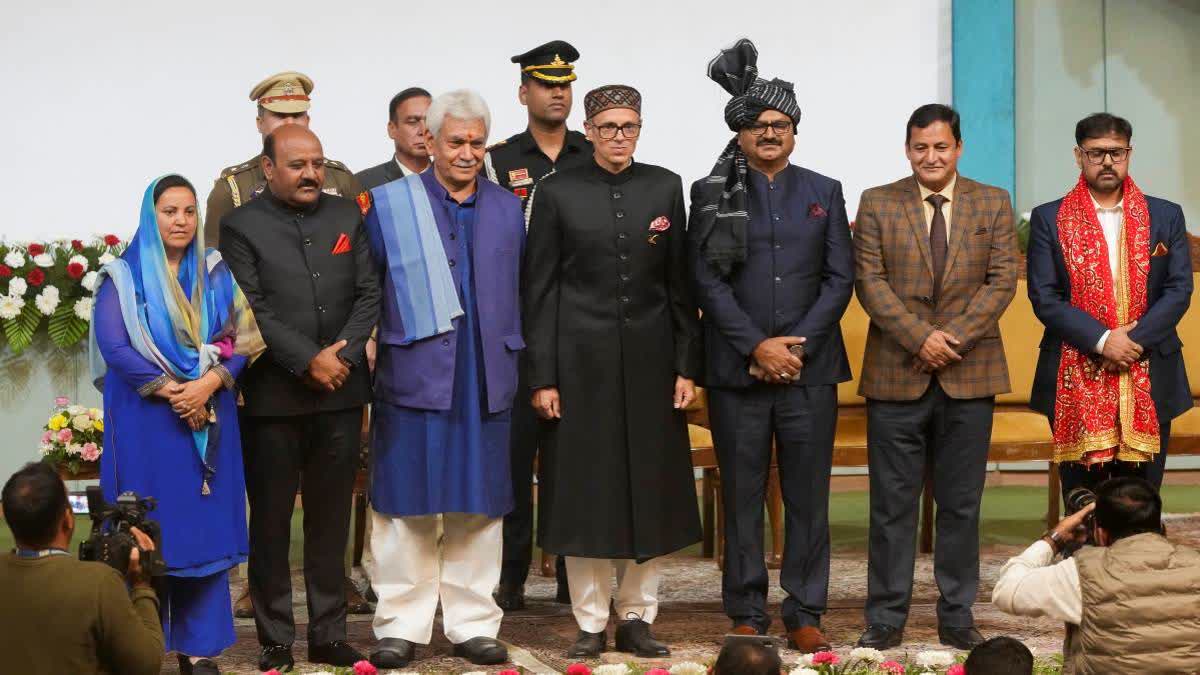Srinagar: The year 2024 in Jammu and Kashmir witnessed first assembly elections in the Union Territory and the people elected the government in October when the National Conference swept the polls and formed the government with support of Congress and other independent legislators.
In political circles and for common people, the elected government was a big relief from the bureaucratic rule of six years. After being sworn in into the government on October 16, the Omar Abdullah led cabinet in its first meeting held on October 18 passed the resolution for restoration of statehood.
The resolution was okayed by the Lieutenant Governor Manoj Sinha the second day and soon Omar rushed to New Delhi and submitted it to the Prime Minister Narendra Modi, Home Minister Amit Shah. Omar also met defence minister Rajnath Singh and Minister for Road, Transport and Highways Nitin Gadkari. Omar presented Kashmiri Pashmina shawls to all those he met in New Delhi. His opponents in Kashmir called it “shawl diplomacy”. But after Omar's first visit and shawl diplomacy, nothing has been worked out yet for the restoration of statehood.
After assuming office, the Omar-led government could not take any major decision which would give it popular support, given its truncated and limited authority to take decisions in view of the UT and sweeping powers to LG over the elected government. But it made a popular decision by reverting the academic session up to Class 1 to 9 to winter session. The academic session was changed by the LG administration to the March session, which was opposed by the students and parents. The change in session by the elected government was applauded by the parents and students alike.
The elected government also set up a cabinet sub-committee to review the reservation policy of 2020 which was implemented by the LG administration after the BJP-led government at the centre amended the policy of 2005 which was deciding the reservation for different categories of population in Jammu and Kashmir. The new policy is being termed discriminatory by the general category who claim that the new rules give just 30 percent of jobs and admissions to the 70 percent population of the general category people.
Another sub-committee was formed to frame the Business rules which would define and demarcate the powers of an elected government and the LG. The sub-committee is headed by the deputy chief minister Surinder Choudhary. It has been set up a month ago, yet the rules are nowhere in sight. There is a lot of secrecy around it in the secretariat and within the government.
Before the elections were announced, the LG led administration took several major decisions which were unpopular in public and were opposed by the political parties. The first was the Government of India’s decision to give sweeping powers to the LG when on July 12, the Ministry of Home Affairs amended the Jammu and Kashmir Reorganisation Act 2019.
The amendments called the Transaction of Business of the Government of Union Territory of Jammu and Kashmir (Second Amendment) Rules, 2024, came into force on July 12, with the publication in the Official Gazette. The president of India Droupadi Murmu approved the amendment under section 55 of the Act.
These amendments gave powers to the LG to control and take decisions about the functioning of the police, public order, the All India Service (AIS) officers, that is bureaucracy, legal affairs such as appointment of Advocate general for JK and his law officers and authority over prison department. These amendments severely curtailed the powers of an elected government, compelling all opposition parties to oppose it, but with no impact.
In October this year, the LG administration amended recruitment rules for the Jammu and Kashmir Police (Gazetted) Service empowering the Jammu and Kashmir Public Service Commission (JKPSC) to recruit officers for these posts and a Departmental Promotion Committee (DPC) comprising chief secretary and director general of police. To decide the promotions of police officers.
The LG administration also amended recruitment rules under the Jammu and Kashmir Civil Services (Decentralization and Recruitment) Act, 2010 which authorises the Service Selection Board (SSB) to recruit employees for all Public Sector Undertakings (PSUs), government companies, corporations, boards, and organisations substantially owned or controlled by the J&K government. The recruitment also included Class IV posts. This amendment was done under Article 309 of the Constitution of India read with Section 15 of the Jammu and Civil Services (Decentralization and Recruitment) Act, 2010.
These changes in the recruitment rules before the elections left no space or say for the elected government in recruitment of employees. This will practically stop the National Conference government from filling any job vacancy even as it has promised in its manifesto to provide one lakh jobs to the youth of Jammu and Kashmir, who are grappling with rising unemployment.
In August, the Administrative Council headed by the LG Manoj Sinha conferred proprietary rights over evacuees’ land to the displaced persons of PoJK of 1947, 1965, 1971 and West Pakistan displaced persons. Besides the LG, the Administrative Council comprises LG's lone adviser Rajiv Rai Bhatnagar, Jammu and Kashmir chief secretary Atal Dullo and principal secretary to LG, Mandeep Kumar Bhandari.
The evacuees property in Jammu and Kashmir belongs to those people who had left to PaK in 1947 after the partition due to the volatile situation at that time. Their property was under the control of the Custodian Department of the JK government. The department would lease out this property for financial purposes, but none was conferred proprietary rights over it.
As per the decision of AC in August, the custodian concerned will transfer the land in favour of the DPs in a time-bound manner, and shall ensure proper safeguards to prevent any misuse particularly unauthorized encroachments on the Evacuees’ land.
Another major decision of the AC was the approval of the Land Pooling Policy. Under this policy, developers or private land owners shall come together to pool their land and obtain authorization for development of infrastructure and the remaining land would be returned to the landowners which they would share proportionately among themselves. The government said land pooling will increase the value of land. The proposed policy would be applicable to notified land parcels of 50 hectares or more.
In the context of the land polling, the administration is planning to build 30 satellite townships along the ring road in Srinagar, Budgam, Baramulla, Bandipora and Ganderbal. Each colony is being proposed to be built on 4000 kanals of land. The land is being unidentified along the road and landowners are protesting against it.
Read more:



